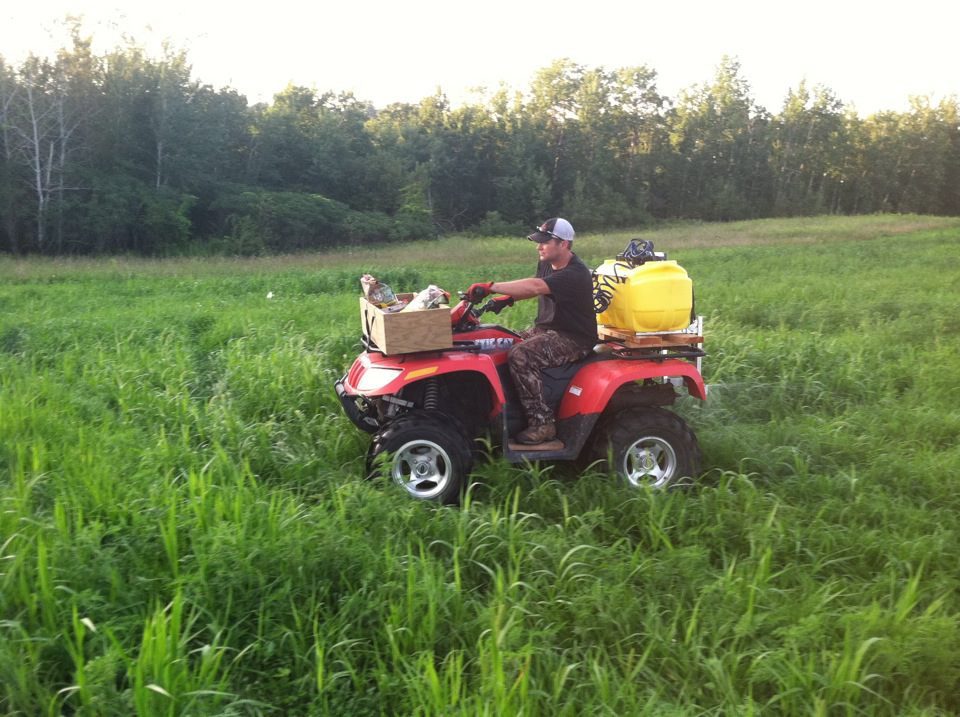Tools are defined as specific implements designed to help you do a job more efficiently. When it comes to food plots, the tools you have available will determine how hard you will have to work. Only have a hoe? You’ll have to work your [expletive] off. Have a push rototiller? You’ll still be working extremely hard. ATV or tractor? Now you can get some serious work done in a smaller amount of time.
The truth is, food plotting is no easy chore. For most of us, myself included, gaining access to the right equipment is the biggest hurdle to planting food plots. Often it involves borrowing pieces of equipment from friends, neighbors, or local farmers for the first few years until you can afford some implements of your own. At a minimum, you’ll need something to kill the weeds, something to expose the soil, and something to disperse or plant the seed.
Below we’ll cover the must-have tools of the food plotting trade for every budget.
Sprayers
Sprayers are first on the list of food plot tools because they are the first and most important tool used in food plot preparation. It’s easy for hunters and land managers to get carried away and jump right to tilling up the ground because it feels like and looks like you’re getting stuff done. Slow them ponies down. I assure you there will be a time when you get to play in the dirt with big boy toys, but it comes after you spray your food plot site with herbicide. Controlling weeds is the most important and difficult task of most food plot projects (see preparing food plots). Depending on your budget and equipment here are some options:
- Backpack or pump sprayer – these sprayers are great for small food plots less than ½ an acre and also for spot spraying later on. A backpack sprayer will typically run right around $50 and will be a good investment for small food plots, especially if they are inaccessible by vehicle.
- ATV Sprayer – If you’ve got more than ½ an acre and have access to an ATV, you’ll definitely want something around the lines of a 15-25 gallon ATV Sprayer to spray your food plots with. An ATV sprayer will run you about $200 give or take and will usually include a wand for spot spraying and a boom or broadcast sprayer nozzle for spraying large areas. Unless you’re planting more than 10 acres of food plots, this sprayer will get the job done just fine.
- 3-point or wagon sprayer – This is for those with big boy toys (a.k.a. tractors), the kind we all wish we owned. If you’ve got more than 10 acres of food plots, chances are you own, hire, or have access to a decent size tractor to do the job of spraying, working up, and planting your food plots. A sprayer that can hold more liquid and spray a wider swath will be of great value. A large, 100+ gallon sprayer will run you a couple thousand bucks.
Working the Soil
Here’s where the job of food plotting gets tough if you don’t have access to the right equipment. For your sake I hope you can at least wrangle up an ATV with a small disc attachment. Breaking ground on new food plots can be a daunting task, especially if there’s an existing sod layer. Use the following equipment breakdown to help you choose the best way to work up your food plots. If there’s a time to contact a local farmer this would be it. Spraying and planting can be done somewhat easily with very minimal equipment, but tilling ground usually requires more horsepower.
 The GroundHog Max is a popular choice for food plotters because it’s small and fits to any ATV.
The GroundHog Max is a popular choice for food plotters because it’s small and fits to any ATV.
- A lighter or torch – one of the easiest and cheapest ways to rid an area of foliage and debris is to burn it off. Of course this requires extreme caution and care when implementing, but should not be overlooked as a means to expose the soil in small food plots. Once it’s burned, plant immediately and rake in the seed to obtain the best seed to soil contact.
- Garden rototiller – They work, but you’ll be sweating your tail off. I wouldn’t recommend doing anything over 1/10th of an acre. Sometimes you just have to use what you have available. Push rototillers do fairly well on previously worked ground, but struggle if there’s any type of sod layer. You’d only use a rototiller if you already have it in the shed, don’t go out and buy one for food plotting.
- ATV disc – you can certainly break up some ground with an ATV, but it likely won’t be as easy as you’d think. ATV pull behind discs work great for sandy soils or previously worked ground, but don’t have the weight required to till new ground effectively. There is a smaller attachment called the Ground Hog Max which uses the weight of the ATV and driver to really dig in. I’ve got no personal experience using this, but it seems like the most effective ATV implement to work up new and old ground. Not to mention it’s a whole lot easier to transport and only costs about $400 for the kit.
- Tractor Implements – A tractor is really the best tool for working up the soil on any type of food plot project over an acre in size. Since there is a variety of implements for the job, we’ve broken them down below.
- PTO Rototiller – This is probably the best tool for breaking up a sod layer and preparing a seed bed. Rather than simply turning the soil, it mixes and mulches the vegetation into the soil and breaks up the clumps leaving a well prepped seed bed behind.
- Disc harrow – With the help of a decently sized tractor, you’ll be able to work the ground with a disc that actually weighs enough to dig in and rip it up.
- No-Till Drill – You won’t need to work up the soil if you have access to a no-till drill. Since it’s technically a planting device, it’ll be covered in the next section.
Planting/Seeding
The work is almost done and now it’s finally time to throw some seed down and watch it grow! Generally speaking, seeding food plots is pretty easy. The most difficult thing about seeding is figuring out how far to open up the spin seeder or calibrating the seed drill correctly. Based upon your budget, here are the best options for planting your food plots.
- Broadcast Spreaders – These come in a variety of shapes and sizes and are what I would say the majority of food plotters use. They are relatively cheap and easy to use and can be used on just about every type of food plot seed other than corn. It’s important to note that with a broadcast type spreader you’ll want to drag and/or cultipack the area after seeding.
- Hand Spin Seeder – Whether you use one with a bag or a plastic bin, they basically function the same way. You open up little gates on the bottom that allow seed to fall onto a spinning disc while you walk around the food plot cranking the handle. It’s always better to start with the opening too small and have to walk over the food plot two or three times compared to starting with too wide of an opening and running out of seed before you cover the entire food plot. A good and versatile hand spin seeder will cost about $40.
- ATV Spreader – Just like spraying, seeding can be done faster and a little bit easier with the help of an ATV attachment. An ATV spreader uses power from the ATV battery to turn the seeder on and off. I plant roughly five acres of soybeans every season with this type of spreader and usually have excellent looking food plots. An ATV spreader will cost roughly $125.
- PTO Spreader – A PTO spreader functions like the ATV 12 Volt spreader, but rather than being battery driven, it’s driven by the PTO and can hold substantially more seed or fertilizer. Obviously, this is made for a tractor with a PTO and will cost a couple hundred bucks.
 A spin seeder like this one is great for planting small food plots.
A spin seeder like this one is great for planting small food plots.
- Seed Planters – These differ from broadcast spreaders in that they put the seed directly into the ground in nice and neat rows – no need to cover the seed by dragging or cultipacking. The most effective planters are pulled behind an ATV or tractor.
- ATV 2 Row Planter – This is a pretty decent planter to have handy for smaller food plots. You can’t rush the job, but a slow and steady approach should yield good results. You can find a 2-row ATV planter for somewhere around $600+.
- Row Planter – Typically anywhere from a 2-8 row planter is what food plotters would use. Because food plotting is most likely a weekend project, it’s hard to justify buying a planter just for planting food plots. If you’re in need of one, throwing $100 at your local farmer will typically get the job done. Price will vary.
- No-Till Drill – If you’re not familiar with a no-till drill, they are the king of food plotting. They are called a no-till drill because you eliminate the step of having to till the soil before planting with a no-till drill. Simply spray, let die, and plant. If everyone could afford one of these, everyone would have one. They reduce erosion, minimize compaction, and save time and fuel, all while building the organic matter of the soil. A good no-till planter will run you a couple grand.

A lot of food plotting equipment is not cheap, and on top of equipment costs are the costs of things like seed, fertilizer, and herbicide. While it can certainly seem like food plots are for the rich, they don’t have to be. If you’re creative, willing to work hard, and have a good reputation with friends and neighbors, chances are you can get your food plots put in for minimal costs. The biggest step is to get started, you’ll learn the rest along the way.
If you want to know what seed to plant in your small food plots check out this article: WHAT TO PLANT IN SMALL FOOD PLOTS
If you want to know how to prepare your food plots for planting check out this article: HOW TO PREP FOOD PLOTS FOR PLANTING







